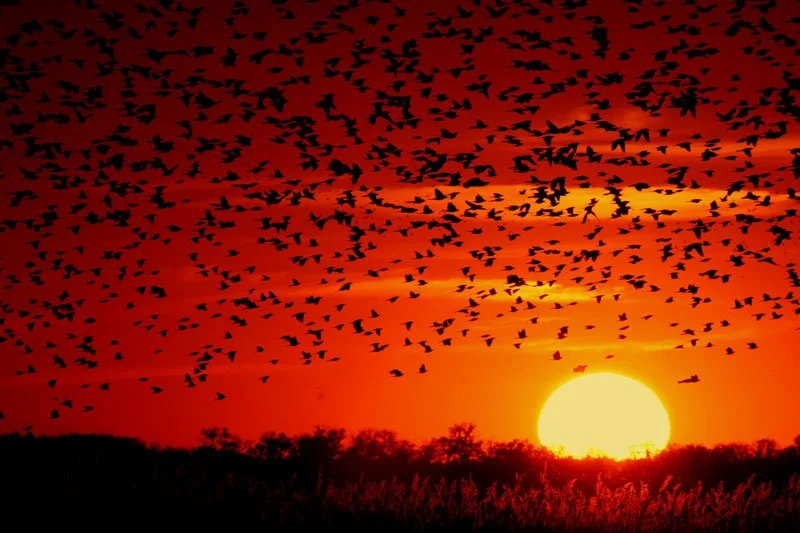“So much world all at once”
Red-winged Blackbirds (Agelaius phoeniceus) flying into the sunset at Quivira National Wildlife Refuge in Kansas. Photo: Jerry Segraves
Dear Friends, Seekers, Imaginers,
A little over a month ago, I had eye surgery. A cloudy lens was removed from each eye and replaced with a clear plastic intraocular lens. The procedure took less time than my morning walk. After two hours, I glided out of the surgery center giddy with astonishment at my improved vision. The white walls were brilliantly white!
For how long had I been seeing white as a muted pale gray? For how long had I been viewing the world through a blurry scrim? Over time, my brain had acclimated to the “dirty” vision, which is to say, my brain had normalized the blurriness without discerning diminished perception. How startling to realize that I had accepted the distortion in color and clarity as an accurate depiction of reality!
Deep breath here.
Doesn’t this sound like a profound metaphor for how we accommodate to our changing circumstances? Not only the waves of disruption we hear AI may bring and the big blows to the rule of law and the demolishment of an old order, but also the continuous low-level seismic shifts in our culture that register only subconsciously? What’s the most accurate image for this phenomenon? Living next to a roiling volcano and ignoring the turbulence? Or the familiar frog in the boiling pot, unable to sense danger before it’s too late?
Watching the evening news, I freeze in disbelief when masked agents jump out of an unmarked vehicle to apprehend the unsuspecting. Then, like the news journalists themselves, I move on to the next story, a cold stone in my gut. How can this be happening? Why isn’t anyone doing something to stop this? How long will this continue?
In the case of cataracts, a physical impediment causes impaired vision, but I’m thinking about how denial works to impair “true sight.” As a writer, I turn to books to learn more. Literature, highbrow and low, is full of examples of how denial heightens dramatic tension, how we, the readers, are at the edge of our seats yelling to the protagonist in denial: Don’t trust that guy. He has a weird blue beard! (“Bluebeard”); Get your troubled daughter some help! (American Pastoral); Move out of that house! (Beloved). We empathize with a character whose heart is not up to facing what must be faced, and we perhaps remember when we were similarly struck.
Denial is aimed at blotting out unacceptable or distressing reality, a defense, sometimes lifesaving, against an overwhelming and possibly horrible truth. (What happened to the birds of our youth? To the butterflies in fields of wildflowers? How will polar bears, penguins, gray whales survive?) Denial may work in the short run, but it never changes the circumstances that evoke the denial. Denial drains our life force and the ability to act. I’ve written more about denial in a previous post, “Denial: Telling Ourselves Stories That Hide the Truth.”
While I would be the first to admit how difficult it is to face our fears, I stand with Carl Jung when he observes in Psychology and Alchemy: “People will do anything, no matter how absurd, to avoid facing their own souls. One does not become enlightened by imagining figures of light but by making the darkness conscious.”
I link arms with the great Polish poet, Wislawa Szymborska, when she writes in “The Century’s Decline”:
Too many things have happened
that weren’t supposed to happen,
and what was supposed to come about
has not.
I write to you in the spirit of friendly inquiry. I am hoping what I’ve said touches something in you that fuels your curiosity and your drive to create. I write this because I, too, am searching for a way to balance the need to turn toward the difficult and the impulse to turn away. I’m reminded of a poem I wrote some years ago, “Elegy to History” which I included in a post about “Xu Bing and Radical Denial.”
We must tell our stories. Let’s mark this moment in our lives. Let’s document how it is for us on planet Earth right now. Let’s give form to the unnamed and unsaid.
In “The Problem of Knowing the World,” Annie Dillard called out what’s involved in pursuing “a penetrating interest.” “In order to know anything for certain, we must first examine the mind’s own way of knowing.” Where is your penetrating interest leading you?
In “Birthday,” Szymborska writes: “So much world all at once—how it rustles and bustles.” The mystery is that there is mystery, and we are a part of it. Let the familiar become unfamiliar. The whole world manifests itself, said Zen master Dõgen, in tall bamboo and banana plants. How marvelous and strange the known world is when we penetrate it beyond our conditioned sight.
As always, with care and gratitude for your presence in my life,
Dale
